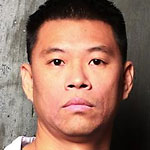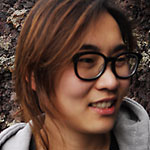
“God is good” Charles spoke softly, as Baldwin stood there watching his 76-year-old father's eyes fill with tears. "God is good." Charles held in his hands a Bible that was owned by his father — Baldwin's grandfather — a man who had left his family in China to work in America. Charles was just 1 year old.
Before that moment, Charles had known little to no information about the man his father was. Now, that Bible offered hope that his father had known God, a realization that shifted the entire way Charles perceived his father.
Baldwin Chiu and his brother had taken their father to Cleveland, Mississippi, in order to find answers about their family's past, while filming their experience for a documentary now called "Finding Cleveland". In partnership with the director and Baldwin's wife, Larissa Lam, they journeyed through a string of heavy-handed coincidences — or what Larissa now calls "God instances" — that ultimately led them to the back storage room of the Mississippi Delta Chinese Heritage Museum in Cleveland, where they found a yellowed Bible out of a box of other artifacts.
The film shows Charles using his fingers to trace over the faded name scrawled on the front page: K.C. Lou. It is the same name of Baldwin's grandfather that they had only seen in an old, recently found picture of a gravestone. The past, present, and future collided in a way that Baldwin and Larissa had never expected.
They had expected this journey to lead them to China, complete with images of a humble ancestral home tucked away somewhere in the foothills of the Far East. However, finding out that Baldwin's grandfather and great-grandfather's resting place was in the deep South made them wonder what had brought their family to Mississippi of all places.
In the midst of their investigation, the Chius learned that when slavery was abolished after the Civil War, plantation owners brought in Chinese men to replace the majority of slave labor that Black people had provided before emancipation. This resulted in a sizable Chinese immigrant population in the South.
The Chius are not exactly sure when Baldwin's great-grandfather arrived in the area or what he did initially. But they know that he had worked his way up until he could own a grocery store in the neighborhood, selling his goods to Black people when they were refused service by white store owners.
At the same time, white churches saw a need for education within the Chinese immigrant community. They set up schools that may have changed the entire faith trajectory of countless Chinese American families. In acting as liaisons between the white and Black communities, Asian Americans and other immigrant minorities in this time period engaged in what Larissa calls "a model of reconciliation" — meaningful, daily interactions.
Baldwin comments, "The Chinese acted as a bridge. They built relationships with both white and Black people — some friendly, some not — but regardless, they built relationships with both, to where they were able to live together in the same community."

Baldwin says further, "These stories need to be told so that everyone understands — Chinese, Blacks, whites, and everyone else — that Asians were here and instrumental. That's the only way all Americans can view all [Asian immigrants] as Americans as well."
Baldwin and Larissa also uncovered an obscure part of American history: the Chinese Exclusion Act of 1882, motivated by racist, public notions that the influx of Chinese immigrants was causing unemployment and decreasing wages. This act restricted Asian immigration as a whole from the time of its conception to when it was finally repealed in 1965. "At first, you hear, 'Okay, 1882, that's a really long time ago,' so you can say, 'Oh, that's really far removed from me,'" Lam reflects on first learning about the Act. "But then when you find out that it wasn't completely repealed until 1965, you realize the long term impact it had on immigration in this country.
"More importantly, I think it's a cautionary tale — if we're not careful, something similar could happen again."
The Chius' story as one Chinese family has implications for all families, as well as broader American history. "It's a story of struggle, racism, unfairness, and not fitting in because you're from a different land, which is the story of every single person who has stepped foot in this country from another," Baldwin says. "If we just label it as something that's Asian — only seen at Asian film festivals or only studied in Asian American history — I think it belittles the contributions of Asians in this country."
Whatever your ethnic background, it is powerful to see Baldwin's father react with a swath of emotions in a single moment — from joy, longing, and thankfulness, to being overwhelmed — when learning about the life of his own father. Charles would have lived his whole life without knowing anything about his father's character, had his sons not decided to take their family on this trip to Mississippi.
Baldwin offers that the American Dream for the current generation is, "to be able to do what you're passionate about, be equal to everyone that you're around, and enjoy the freedom to dream." He dreams knowing that his life — and thereby the kinds of dreams he can have — is framed by his forefathers' sacrifices. Embarking on a pilgrimage to Cleveland was a way for Baldwin to have a value for and pull the past forward with patience and understanding toward the older generation. Despite cultural and generational differences with his son, Baldwin's own father also needed an understanding of who he was in connection to his family's historical story — such basic information we take for granted or oftentimes still don't have today.
The Chiu family story stresses the complicated connections that immigrant families have with the older generations. Before the trip, Baldwin and Larissa tended to think about family as those who currently surround them. Now, Larissa says, "What my grandparents and great-grandparents did — the decisions they made, and their sacrifices — set in motion the course for where we are now." "Finding Cleveland" extends to its audience an expanded understanding of family: to include not only the members of the family that are present with you, but also previous and following generations as part of a greater narrative.
Who do we consider a part of our family? Baldwin contributes, "I think about how my great-grandfather and my grandfather didn't even have a concept of me or my daughter, yet we are the ones who actually benefit from what they did. It makes me want to encourage and promote communication between the generations more. If we don't do that, we're going to lose a lot more than just history. We're going to lose family relationships, understanding, compassion, and ultimately the love that we would have received, but unintentionally rejected."
The Chius uncovered that their family's faith history went back further generations than they realized. Baldwin's life had been peppered with microaggressions along the lines of, "You're not supposed to be Christian because you're Asian. You're supposed to be Buddhist, Daoist, or some other Eastern religion!"
With the discovery of his grandfather's Bible, the whole family feels the weight of God's extreme grace and blessings. Out of all of the recovered belongings of his grandfather, this Bible embodies hope, as Baldwin believes, "I never, ever thought I would meet my grandfather. My father felt the exact same way ... but we might actually see my grandfather someday in heaven. We would have never thought that God was in the midst of my grandfather's life."
Baldwin's story — from encompassing the role of Chinese immigrants in Reconstruction South to their family's personal history — inextricably weaves these macro and micro elements together. Contrary to the passivity that Asian Americans are often associated with in history, the Chius paint a different picture: from early Chinese immigrants filling in the gap between white and Black communities to Baldwin taking initiative in asking hard questions about a difficult past.
Baldwin's young daughter can now grow up having knowledge of how her own life is a part of greater American history, imagining how her family can extend not only through multiple generations, but to all those who touch our lives in significant ways — whether they be Chinese, Black, or white, and whether they live in California, or in Mississippi. Through patient and compassionate engagement with our pasts, we can better gift future generations with knowledge of how to build relationships with different communities. In finding Cleveland, Baldwin and Larissa found God — and family — in an unexpected place, through a history they never thought existed.
You can learn more about “Finding Cleveland” atfindingcleveland.com or on Facebook at facebook.com/FindingCleveland.

Baldwin Chiu aka: Only Won is a hip-hop artist originally from Northern California who raps about unconventional subjects like God, dim sum & thermodynamics. He’s had over a million views on YouTube of his clever parodies like “I Wanna Be an Engineer” and “Cantonese Boy”. He’s also a spokesperson for the White House/ Intel engineering campaign “Stay With It”.

Larissa Lam is a former chief financial officer turned award- winning singer-songwriter and filmmaker. As a missionary with Artists in Christian Testimony, she travels the country speaking and performing at numerous outreach events. For nine years, she hosted “Top 3” on Christian youth network, JUCE TV and currently hosts a new young adults advice talk show, “UTalk Radio.”

Ivy Chang is a designer based in the Bay Area. She came to the U.S. from Taiwan when she was 10 and met her first wild animal in New Hampshire. She is inspired by the exploration and language of life, the little and big moments that resonate with her. Her work often involves anthropomorphic animals and objects as a way of storytelling from a humorous and charming perspective.
